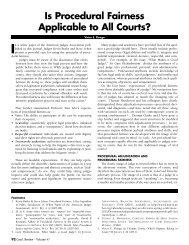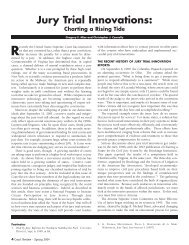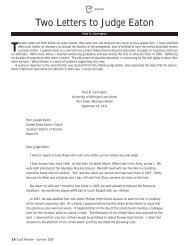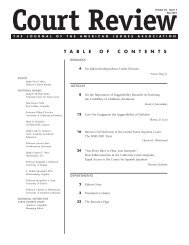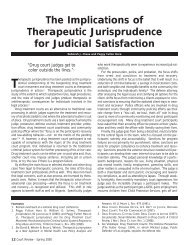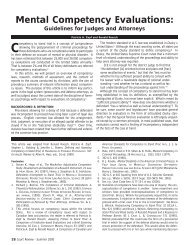Special Issue on Procedural Fairness - American Judges Association
Special Issue on Procedural Fairness - American Judges Association
Special Issue on Procedural Fairness - American Judges Association
- No tags were found...
Create successful ePaper yourself
Turn your PDF publications into a flip-book with our unique Google optimized e-Paper software.
[O]ur questi<strong>on</strong>s toparticipantsincluded measuresof three motivesthat we expectedmight explain whyauthorities andsubordinates differin their fairnessand satisfacti<strong>on</strong>judgments....voice their opini<strong>on</strong> and c<strong>on</strong>cernsabout the proposedchanges before deciding <strong>on</strong> acourse of acti<strong>on</strong> (the opportunityto “voice” <strong>on</strong>e’s viewsbefore a decisi<strong>on</strong> is made hasbeen clearly established as animportant procedural fairnessc<strong>on</strong>cern 26 and has been linkedto percepti<strong>on</strong>s of respectfultreatment 27 ).Participants in the highthreat c<strong>on</strong>diti<strong>on</strong> learned thatthe increased costs were sufficientlylarge to pose a threatto the company’s survival,whereas participants in the low threat c<strong>on</strong>diti<strong>on</strong> learned thatthe increased costs were moderate and not a serious threat tothe company’s survival. Participants assigned to the high voicec<strong>on</strong>diti<strong>on</strong> learned that that the CFO had decided to meet withthem prior to making his decisi<strong>on</strong>, whereas participantsassigned to the low voice c<strong>on</strong>diti<strong>on</strong> learned that the CFO haddecided not to meet with them prior to making his decisi<strong>on</strong>.Because this study was designed to examine why these variablesaffect authorities and subordinates differently, our questi<strong>on</strong>sto participants included measures of three motives thatwe expected might explain why authorities and subordinatesdiffer in their fairness and satisfacti<strong>on</strong> judgments: protectingthe company’s welfare, dem<strong>on</strong>strating a c<strong>on</strong>cern for the welfareof individual employees, and treating the employees withrespect.Several results of this study are noteworthy. First, the findingsof this study replicated those of Heuer et al. 28 Am<strong>on</strong>g participantswho adopted the perspective of the CFO, there wasvirtually no effect of voice <strong>on</strong> procedural fairness judgments,but voice did affect the procedural fairness judgments of participantsin the role of the decisi<strong>on</strong> recipient, or employee.Further, percepti<strong>on</strong>s of procedural fairness more str<strong>on</strong>glyinfluenced the satisfacti<strong>on</strong> of decisi<strong>on</strong> recipients than decisi<strong>on</strong>makers.Sec<strong>on</strong>d, our predicti<strong>on</strong> that a c<strong>on</strong>cern with protecting thegroup’s welfare would be more important for decisi<strong>on</strong> makersthan decisi<strong>on</strong> recipients was supported for both proceduralfairness and satisfacti<strong>on</strong> judgments. Thus, the findings of thisstudy extend the findings of Heuer et al 29 by pointing toauthorities’ motivati<strong>on</strong> to protect the group as at least <strong>on</strong>e reas<strong>on</strong>for their greater c<strong>on</strong>cern with outcomes than with procedures.Finally, two of our predicti<strong>on</strong>s were not supported. We predictedthat the employees’ fairness and satisfacti<strong>on</strong> judgmentswould be more favorably influenced than the authorities’ judgmentsby evidence that the authority had dem<strong>on</strong>strated a c<strong>on</strong>cernfor the welfare of individual employees and had beenrespectful. In fact, c<strong>on</strong>cern for individuals’ welfare was moreimportant am<strong>on</strong>g the decisi<strong>on</strong> makers, and respect was equallyimportant for decisi<strong>on</strong> makers and decisi<strong>on</strong> recipients. Whileadditi<strong>on</strong>al research is necessary before we can speak authoritativelyabout these effects, we offer the following speculati<strong>on</strong>:We suspect that in this study, a c<strong>on</strong>cern for employee welfaremight have mattered more to the authorities because they d<strong>on</strong>ot view this c<strong>on</strong>cern as a symbol of group standing (as it ischaracterized by the group value theory), but rather as a pragmaticc<strong>on</strong>cern for protecting the individual employee’s ec<strong>on</strong>omicwelfare (protecting their job). We think this interpretati<strong>on</strong>is c<strong>on</strong>sistent with the general pattern of findings throughoutour studies. Sec<strong>on</strong>dly, we propose that respect was equallyimportant for fairness and satisfacti<strong>on</strong> am<strong>on</strong>g authorities andsubordinates because our analysis tested its influence whilec<strong>on</strong>trolling for the effect of the CFO’s course of acti<strong>on</strong> <strong>on</strong> thecompany’s welfare. Essentially, we propose that <strong>on</strong>ce theauthority’s c<strong>on</strong>cern for protecting the group is c<strong>on</strong>trolled for,there is no tensi<strong>on</strong> between treating employees respectfullyand protecting the group’s welfare; respectful treatment—acommunicati<strong>on</strong> that the subordinate is valued by the group—is seen as desirable by both decisi<strong>on</strong> makers and decisi<strong>on</strong>recipients.In sum, this study replicated and extended the findings ofHeuer et al, 30 dem<strong>on</strong>strating that voice is less important for thefairness judgments of authorities, and fairness is less importantfor the satisfacti<strong>on</strong> of authorities. But the findings of this studyalso supported the predicti<strong>on</strong> that authorities are more c<strong>on</strong>cernedwith instrumental motives related to protecting thegroup and its members. It therefore appears that authorities arefocused <strong>on</strong> using procedures that they feel will protect thegroup, rather than trying to communicate a relati<strong>on</strong>al messageto the group’s members. However, the relati<strong>on</strong>al message is notunimportant to authorities – in essence, when c<strong>on</strong>cerns aboutprotecting the group are taken into account, there was no differencebetween authorities and subordinates in the importancethey placed <strong>on</strong> respectful treatment. As l<strong>on</strong>g as the decisi<strong>on</strong>makers felt that they were protecting the decisi<strong>on</strong> recipients’and the group’s welfare, they were as c<strong>on</strong>cerned as decisi<strong>on</strong>recipients were about decisi<strong>on</strong> recipients being treatedrespectfully.The findings of this study indicate that increased c<strong>on</strong>cernwith group protecti<strong>on</strong> is <strong>on</strong>e feature that differentiates decisi<strong>on</strong>makers and decisi<strong>on</strong> recipients, and more str<strong>on</strong>gly influencesthe fairness and satisfacti<strong>on</strong> judgments of decisi<strong>on</strong> makers.This finding is important because it begins to illuminate whydecisi<strong>on</strong> makers and decisi<strong>on</strong> recipients reas<strong>on</strong> differently26. THIBAUT & WALKER, supra note 3; Gerald S. Leventhal, WhatShould Be D<strong>on</strong>e With Equity Theory? New Approaches to the Studyof <strong>Fairness</strong> in Social Relati<strong>on</strong>ships, in SOCIAL EXCHANGE: ADVANCESIN THEORY AND RESEARCH 27 (Kenneth J. Gergen, et al. eds., 1980);John Thibaut & Laurens Walker, A Theory of Procedure, 66 CALIF.L. REV. 541(1978).27. LIND &TYLER, supra note 6; Tyler, supra note 22.28. Heuer et al., supra note 13.29. Id.30. Id.31. Id.68 Court Review - Volume 44




